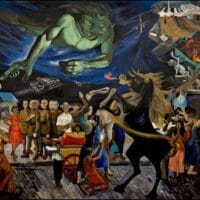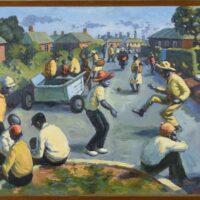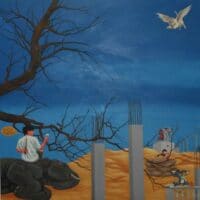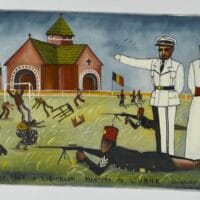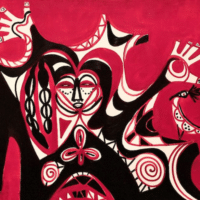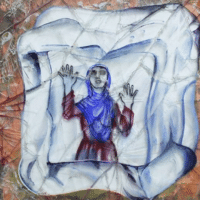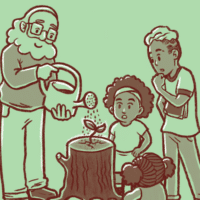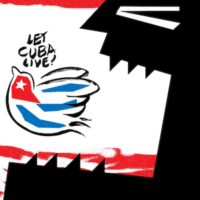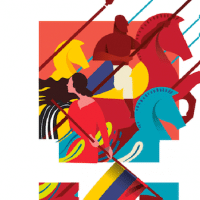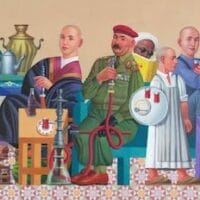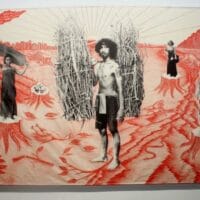-
Women hold up more than half the sky: The Forty-First Newsletter (2021)
Indian peasants and agricultural workers remain in the midst of a country-wide agitation sparked by the proposal of three farm bills that were then signed into law by the right-wing Bharatiya Janata Party government in September 2020.
-
A World without hunger: The Fortieth Newsletter (2021)
There is nothing more obscene than the existence of hunger, the terrible indignity of working hard but being without the means for sustenance.
-
If the United Nations Charter was put to a vote today, would it pass?: The Thirty-Ninth Newsletter (2021)
Each year in September, the heads of governments come to the United Nations Headquarters in New York City to inaugurate a new session of the General Assembly.
-
Where flowers find no peace enough to grow: The Thirty-Eighth Newsletter (2021)
On 13 July 2021, the United Nations Human Rights Council (UNHRC) adopted a landmark resolution on the prevalence of racism and for the creation of an independent mechanism made up of three experts to investigate the root cause of deeply embedded racism and intolerance.
-
The sound of his approaching step wakes me and I see my land’s deprivation: The Thirty-Seventh Newsletter (2021)
On Wednesday, 8 September, party workers of the Bharatiya Janata Party (BJP), India’s ruling political party, attacked three buildings in the Melarmath area of Agartala (Tripura). These attacks targeted the offices of the Communist Party of India (Marxist), the communist newspaper Daily Deshar Katha, and two private media houses Pratibadi Kalam and PN-24.
-
Solely because of the increasing disorder: The Thirty-Sixth Newsletter (2021)
A few days ago, I spoke to a senior official at the World Health Organisation (WHO). I asked her if she knew how many people lived their lives on our planet without shoes.
-
Africa’s uprising is frozen, its cry swollen with hope: The Thirty-Fifth Newsletter (2021)
On 26 August, two deadly attacks on the perimeter of Kabul’s international airport killed over a hundred people, including a dozen U.S. soldiers. The bombings struck people desperate to enter the airport and flee Afghanistan. Not long afterwards, the Islamic State of Khorasan (IS-K) took credit for the attack.
-
I awakened here when the Earth was new: The Thirty-Fourth Newsletter (2021)
Speaking on the impact of the climate crisis on First People, Gavin Singleton from the Yirrganydji traditional owners explained that ‘From changing weather patterns to shifts in natural ecosystems, climate change is a clear and present threat to our people and our culture’.
-
Create two, three, many Saigons. That is the watchword: The Thirty-Third Newsletter (2021)
On Sunday, 15 August, Afghanistan’s President Ashraf Ghani fled his country for Uzbekistan. He left behind a capital city, Kabul, which had already fallen into the hands of the advancing Taliban forces.
-
Show the children the green fields and let the sunshine into their minds: The Thirty-Second Newsletter (2021)
The turn to digital education has emboldened mega-corporations to enclose the commons of public education, making it harder and harder for the masses of children to have access to any education at all. Big business sees the opportunity clearly.
-
China eradicates absolute poverty while billionaires go for a joyride to space: The Thirty-First Newsletter (2021)
During this bleak period, in late February 2021, China’s president Xi Jinping announced that–counter to this general global downturn–China had eradicated extreme poverty. What does this announcement mean?
-
The great contest of our time is between humanity and imperialism: The Thirtieth Newsletter (2021)
On 23 July 2021, a full-page appeal appeared in the New York Times calling on United States President Joe Biden to withdraw the vindictive U.S. blockade against Cuba.
-
Washington beats the drum of regime change, but Cuba responds to its own revolutionary rhythm: The Twenty-Ninth Newsletter (2021)
Four days after Moïse’s assassination, Cuba experienced a set of protests from people expressing their frustration with shortages of goods and a recent spike of COVID-19 infections.
-
A senseless cathedral of doom
The principal causes of conflict on the continent, SIPRI summarises, are: ‘state weakness, corruption, ineffective delivery of basic services, competition over natural resources, inequality, and a sense of marginalisation’.
-
Women everywhere in the World are squeezed into a tight corner
Between 30 June and 2 July 2021, the United Nations and other multilateral organisations held the Generation Equality Forum in Paris (France).
-
Cuba’s vaccine shield and the five monopolies that structure the World: The Twenty-Sixth Newsletter (2021)
In 1869, at the age of fifteen, José Martí and his young friends published a magazine in Cuba called La Patria Libre (‘The Free Homeland’), which adopted a strong position against Spanish imperialism. The first and only issue of the magazine carried Martí’s poem, ‘Abdala’.
-
The spirit of Carabobo will overcome the stench of Monroe. The Twenty-Fifth Newsletter (2021)
Two hundred years ago, on 24 June 1821, the forces of Simón Bolívar trounced the Spanish royalists at the Battle of Carabobo, a few hundred kilometres west of Caracas, Venezuela.
-
Every region of the World is the worst affected
The impact of this food price rise will grievously hit developing countries, most of whom are major importers of food staples.
-
We hug the trees because the trees have no voice
In 1974, the UN urged the world to celebrate that day on 5 June with the slogan ‘Only One Earth’; this year, the theme is ‘Ecosystem Restoration’, emphasising how the capitalist system has eroded the earth’s capacity to sustain life.
-
Lenin went to dance in the snow to celebrate the Paris Commune and the Soviet Republic
The workers of Paris created the Commune on 18 March, building on the wave of revolutionary optimism that first lapped on the shores of France in 1789 and then again in 1830 and 1848.



